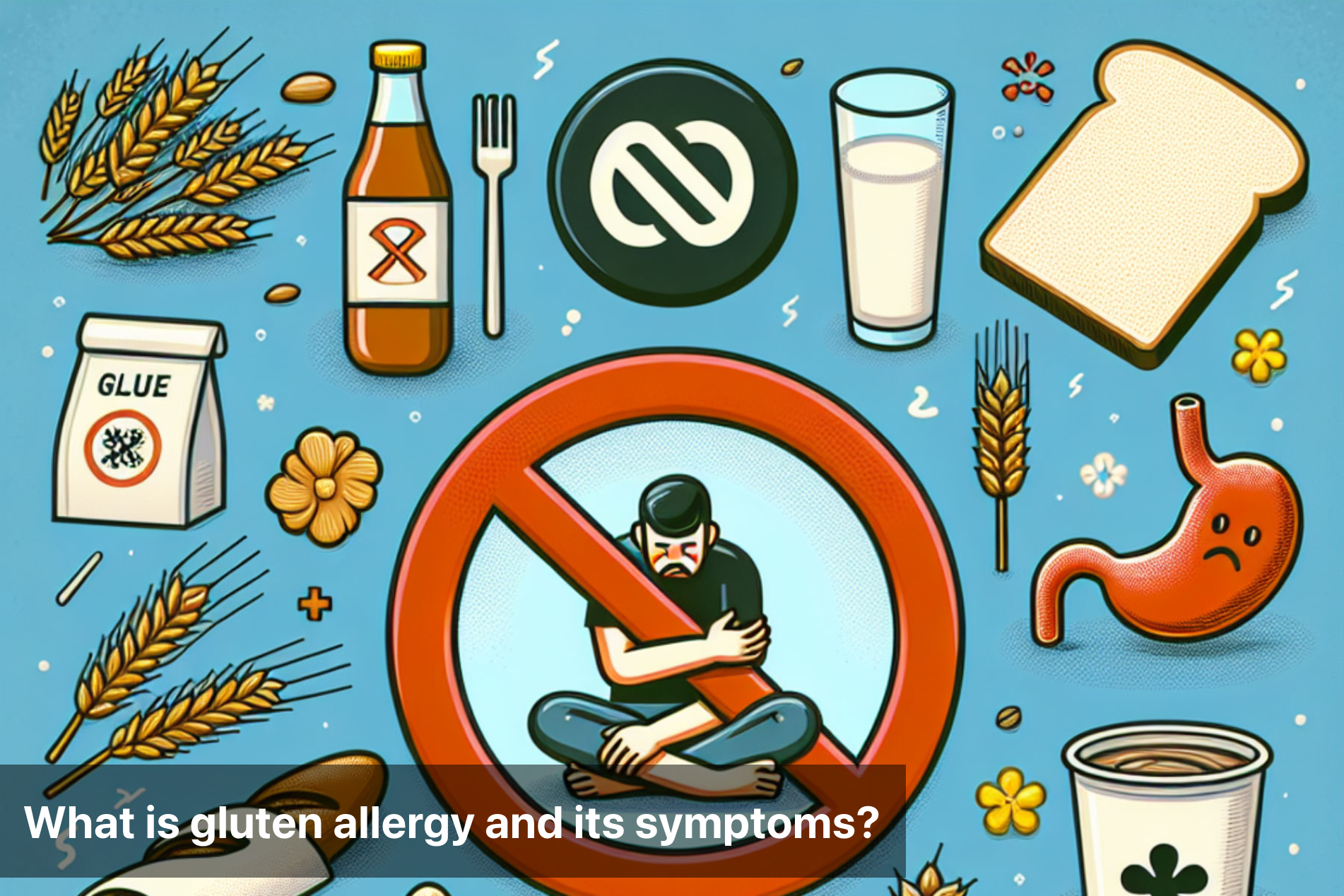
What is gluten allergy and its symptoms?
Gluten allergy, also known as gluten sensitivity, is a condition where the immune system reacts negatively to gluten, a protein found in wheat, barley, and rye. This immune response triggers various symptoms that can range from mild to severe. It is essential to differentiate between gluten allergy and gluten intolerance, as they involve distinct immune responses. Unlike gluten allergy, where the immune system reacts to gluten proteins, gluten intolerance does not involve an immune response but rather an inability to digest gluten properly.
Individuals with gluten allergy may experience symptoms such as digestive issues, skin rashes, fatigue, and joint pain after consuming gluten-containing foods. These symptoms can impact daily life and lead to discomfort and health complications if not managed effectively. On the other hand, gluten intolerance symptoms primarily manifest as digestive problems like bloating, gas, and diarrhea.
Understanding the difference between gluten allergy and gluten intolerance is crucial for proper diagnosis and management. If you suspect you have a gluten-related issue, consulting a healthcare professional for evaluation is recommended. Proper diagnosis can help in determining the appropriate treatment plan and lifestyle adjustments to alleviate symptoms and improve overall well-being.

Causes of Gluten Allergy
The primary causes of gluten allergy (often referred to as gluten intolerance or sensitivity) stem from the body's abnormal immune response to gluten, a protein found in wheat, barley, and rye. Here are the key causes:
-
Genetic Predisposition: Some individuals have a genetic tendency to develop gluten-related disorders, such as celiac disease or wheat allergy.
-
Celiac Disease: This autoimmune disorder occurs when the immune system mistakenly attacks the small intestine after gluten consumption, leading to inflammation and damage.
-
Wheat Allergy: In this case, the immune system treats gluten or other proteins in wheat as harmful, triggering an allergic reaction, similar to other food allergies.
-
Non-Celiac Gluten Sensitivity (NCGS): While not an autoimmune disorder or allergy, NCGS causes adverse reactions to gluten, possibly due to digestive or immune system sensitivities.
-
Environmental Factors: In some cases, exposure to infections, early introduction of gluten in infants, or gut microbiome imbalances can trigger gluten allergies or sensitivities.
Symptoms of Gluten Allergy
|
System Affected |
Common Symptoms of Gluten Allergy |
|---|---|
|
Digestive System |
Abdominal pain, bloating, diarrhea, constipation, nausea, vomiting, gas |
|
Skin |
Itchy rash (dermatitis herpetiformis), hives, eczema |
|
Respiratory System |
Difficulty breathing, nasal congestion, wheezing, asthma-like symptoms |
|
Nervous System |
Headaches, dizziness, brain fog, anxiety, depression, mood swings |
|
Musculoskeletal System |
Joint pain, muscle cramps, weakness, numbness in limbs |
|
Immune System |
Fatigue, chronic tiredness, frequent infections |
|
Weight and Growth |
Unexplained weight loss, growth issues in children |
|
Mouth and Throat |
Swelling or itching in the mouth and throat, difficulty swallowing (in severe cases) |
|
Nutrient Deficiencies |
Anemia (iron deficiency), vitamin D and calcium deficiencies (due to malabsorption) |
Diagnosis and Treatment of Gluten Allergy
Diagnosis
-
Medical History and Symptom Assessment: The doctor will review symptoms, diet, and family history to assess the likelihood of a gluten allergy or related conditions.
-
Blood Tests: Blood tests are used to detect specific antibodies (like anti-tissue transglutaminase antibodies or IgE antibodies for wheat allergy) that indicate gluten sensitivity or celiac disease.
-
Skin Prick Test (for Wheat Allergy): This test helps identify wheat allergies by exposing the skin to small amounts of wheat extract and monitoring for allergic reactions.
-
Endoscopy and Biopsy: For diagnosing celiac disease, an endoscopy is performed to take a small tissue sample from the small intestine, which is then examined for signs of damage caused by gluten.
-
Gluten Elimination Diet: A doctor may recommend a gluten-free diet for several weeks to observe symptom improvement, followed by a gluten challenge (reintroducing gluten) to confirm the diagnosis.
-
Genetic Testing: Genetic tests can identify genes (HLA-DQ2 or HLA-DQ8) associated with a higher risk of developing celiac disease, though these genes alone do not confirm the condition.
Treatment
-
Gluten-Free Diet:
The primary treatment is the complete elimination of gluten from the diet. This means avoiding all foods containing wheat, barley, rye, and their derivatives. -
Managing Nutritional Deficiencies:
For people with celiac disease or gluten sensitivity, it's important to ensure that they receive adequate nutrients like iron, calcium, fiber, and vitamins that might be lacking in a gluten-free diet. -
Medications (for Wheat Allergy):
-
Antihistamines: These may be prescribed to relieve mild symptoms such as hives or itching.
-
Epinephrine (Adrenaline): For those with severe wheat allergies or risk of anaphylaxis, an epinephrine auto-injector (EpiPen) may be necessary in emergency situations.
-
-
Monitoring and Follow-up:
Regular follow-up with a healthcare provider is important to monitor symptom management and overall health, especially for people with celiac disease. -
Education and Support:
Learning how to read food labels, understand cross-contamination risks, and select safe gluten-free products is crucial. Support groups or dietitian consultations can help with long-term management.

Gluten Allergy: Symptoms, Causes, and Diagnosis
Understanding the key points related to gluten allergy and its symptoms is crucial for managing this condition effectively. Gluten allergy refers to an adverse reaction triggered by the consumption of gluten-containing foods.
Individuals with gluten allergy may experience symptoms such as abdominal pain, bloating, diarrhea, and fatigue. These symptoms can vary in severity and may occur shortly after consuming gluten-containing products. It is essential to differentiate between gluten allergy and gluten intolerance, as the latter typically involves milder symptoms such as bloating and fatigue.
Diagnosing gluten allergy often involves a combination of blood tests, endoscopy, and elimination diets. Once diagnosed, treatment options for gluten allergy include following a strict gluten-free diet and possibly consulting with a dietitian for guidance on nutrition.
Recognizing and understanding the symptoms of gluten allergy is key to managing this condition and improving overall quality of life. By being aware of the signs of gluten allergy and seeking timely diagnosis and treatment, individuals can effectively navigate the challenges associated with this condition.
This Blog post is an initiative by Lo! Foods, to provide accurate and Nutritionist / Doctor approved information related to Health. Lo! Foods is India's leading brand for Everyday Functional Foods. Foods designed for specific Health conditions or Needs. Lo! Foods also runs India's largest range of Low Carb Healthy Cloud Kitchens, under the brand names of Lo!, ProteinChef, ATH (All Things Healthy) and DiabeSmart.















Leave a comment
Your email address will not be published.